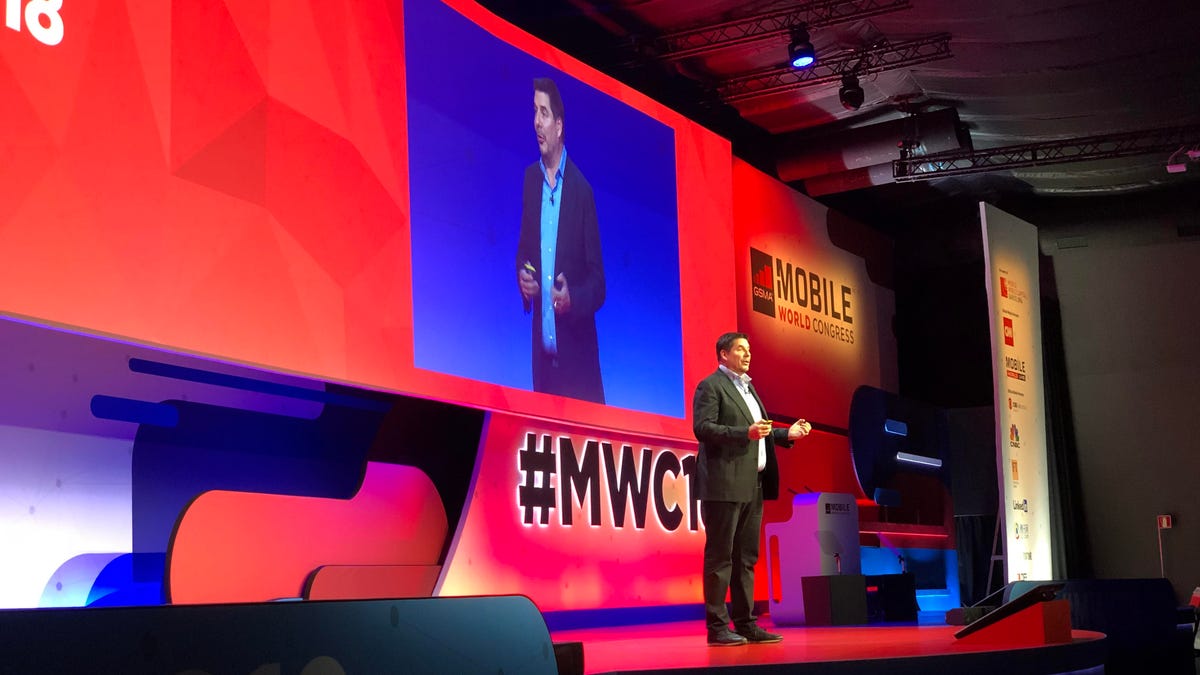Sprint shuffles execs as it looks toward future under T-Mobile
Three days after it announced a $26 billion merger with T-Mobile, Sprint reveals changes in its top ranks and positive quarterly results. But it still needs regulators to go along with the deal.

Sprint CEO Marcelo Claure speaking at MWC 2018.
Sprint is looking ahead to its $26 billion merger with T-Mobile as it shuffles top executives and makes its pitch for the merger to federal regulators in Washington, DC.
On Wednesday, the company announced CEO Marcelo Claure will become executive chairman while the company's chief financial officer, Michel Combes, will take over as CEO by the end of this month.
The change in the top ranks comes also as the company announces some positive news for its fiscal fourth quarter with the addition of 55,000 new postpaid phone customers, a positive sign for a company that has struggled to compete with its three larger rivals. The company also reported a profit for the quarter of $69 million, or 2 cents per share. This compares with a loss of $283 million, or 7 cents per share, in the same quarter last year.
T-Mobile and Sprint on Sunday announced a $26 billion deal to merge, bringing together the nation's third- and fourth-largest wireless service providers. The deal comes at a time when US carriers are doing everything they can to win new customers. Some are offering free access to services like Netflix, as well as the revival of unlimited data plans for smartphone customers. Sprint has even resorted to giving away a year of service for free. Those competitive pressures are what's brought T-Mobile and Sprint together.
While the companies' executives tout the scale of a combined company to make them competitive with rivals AT&T and Verizon, consumer activists and analysts are skeptical regulators will go along with reducing the number of nationwide carriers from four to three. Most analysts say they think there is only a 50 percent chance that regulators will approve the deal.
The companies have wasted no time in pitching their story to Washington regulators, who have signaled in the past they wouldn't approve such a deal. On a call with investors, Claure said he's pleased so far with what he says is a willingness by officials at both the FCC and the Department of Justice to keep an open mind regarding the deal. This echoed sentiments T-Mobile's CEO John Legere made Tuesday on his company's earnings call.
"We've analyze the types of mergers that get approved," he said. "And we're feeling extremely positive."
Before the merger was announced, both companies had hyped their promises of 5G greatness. But now the companies' executives say the only way to ensure US dominance in 5G is to allow the companies to merge. And by doing that, Claure claims they can build a network that is even better than what either AT&T or Verizon can build.
"The US needs to lead in 5G," Claure told CNBC on Monday. "The only way to lead 5G is by combining Sprint and T-Mobile. AT&T cannot do it. Verizon cannot do [it]… the way we're are going to build this 5G network."
But critics like former FCC Chairman Tom Wheeler, a Democrat appointed by President Barack Obama, say that building a world-class 5G network does not mean regulators should allow the wireless industry to consolidate and risk harming customers by offering fewer choices and higher prices. Instead, he suggests wireless companies partner to share the cost of building the expensive infrastructure needed to deploy 5G.
"Sharing network infrastructure in order to better allocate capital and thus expand service to more people is not a radical idea," he said in a blog post for the Brookings Institute.
He explained that in the mid-1990s telecommunications providers shared the cost of building a common network.
"Their consumers never knew this was happening, and the companies engaged in full-throated competition with each other even while using the same infrastructure," he wrote. "It was a smart business decision then, and it would be equally smart today to deal with the high investment costs associated with 5G -- and to do so without diminishing competition!"
Cambridge Analytica: Everything you need to know about Facebook's data mining scandal.
Tech Enabled: CNET chronicles tech's role in providing new kinds of accessibility.

